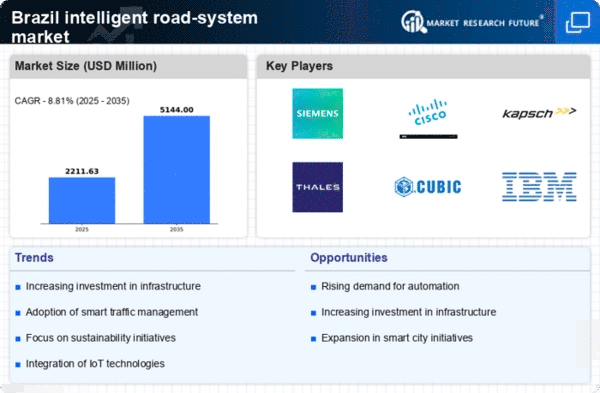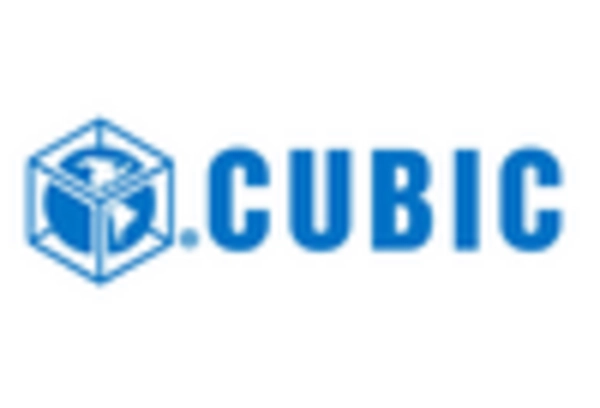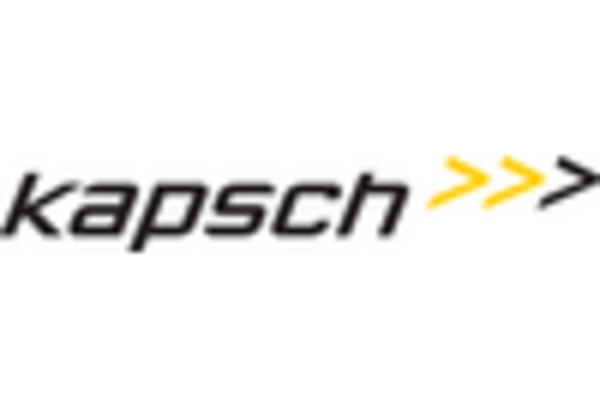Rising Urbanization and Traffic Demand
Brazil is experiencing rapid urbanization, with over 85% of its population residing in urban areas. This trend places immense pressure on existing transportation infrastructure, leading to increased demand for intelligent road systems. The intelligent road-system market is projected to grow. Cities seek solutions to manage traffic flow and enhance safety. According to recent studies, urban traffic congestion costs Brazil approximately $30 billion annually in lost productivity. As a result, municipalities are investing in smart traffic management systems, which utilize real-time data to optimize traffic signals and reduce congestion. This growing urban population and the associated traffic challenges are likely to propel the intelligent road-system market forward, as cities strive to create more efficient and sustainable transportation networks.
Government Initiatives for Smart Mobility
The Brazilian government actively promotes smart mobility initiatives, which significantly influence the intelligent road-system market. Programs aimed at enhancing urban mobility and reducing traffic congestion are being implemented across major cities. For instance, the National Urban Mobility Policy encourages the integration of intelligent transportation systems (ITS) to improve traffic management. This policy aims to reduce travel times by 20% and enhance road safety by 30% by 2030. Such initiatives are expected to drive investments in intelligent road systems, as municipalities seek to modernize their infrastructure and adopt advanced technologies. The intelligent road-system market is likely to benefit from these government-led efforts. They create a conducive environment for innovation and collaboration between public and private sectors.
Focus on Road Safety and Accident Reduction
Road safety remains a pressing concern in Brazil, with traffic accidents resulting in significant fatalities and economic losses. The intelligent road-system market is increasingly focused on solutions. These solutions enhance safety and reduce accidents. Recent statistics indicate that Brazil has one of the highest road fatality rates in the world, prompting authorities to seek innovative approaches to mitigate this issue. The implementation of intelligent traffic management systems, which utilize real-time data to monitor and respond to traffic conditions, is expected to play a pivotal role in improving road safety. By investing in these technologies, Brazil aims to decrease road fatalities by 50% by 2030. This commitment to enhancing safety is likely to drive growth in the intelligent road-system market, as stakeholders prioritize the development of safer transportation networks.
Technological Advancements in Transportation
Technological advancements play a crucial role in shaping the intelligent road-system market in Brazil. Innovations such as vehicle-to-everything (V2X) communication, artificial intelligence (AI), and big data analytics are transforming how transportation systems operate. These technologies enable real-time monitoring and management of traffic conditions, enhancing safety and efficiency. For instance, the integration of AI in traffic management systems can lead to a 25% reduction in accidents. Furthermore, the Brazilian government is investing in research and development to foster innovation in transportation technologies. This focus on technological progress is likely to drive the intelligent road-system market, as stakeholders seek to implement cutting-edge solutions that address the challenges of urban mobility.
Public-Private Partnerships for Infrastructure Development
Public-private partnerships (PPPs) are emerging as a vital driver for the intelligent road-system market in Brazil. These collaborations between government entities and private companies facilitate the development and implementation of advanced transportation solutions. By pooling resources and expertise, PPPs can accelerate the deployment of intelligent road systems, which are essential for modernizing Brazil's infrastructure. Recent projects have demonstrated that such partnerships can reduce project costs by up to 15% while improving service delivery. As cities face increasing demands for efficient transportation, the role of PPPs in the intelligent road-system market is likely to expand, fostering innovation and enhancing the overall quality of urban mobility.
















